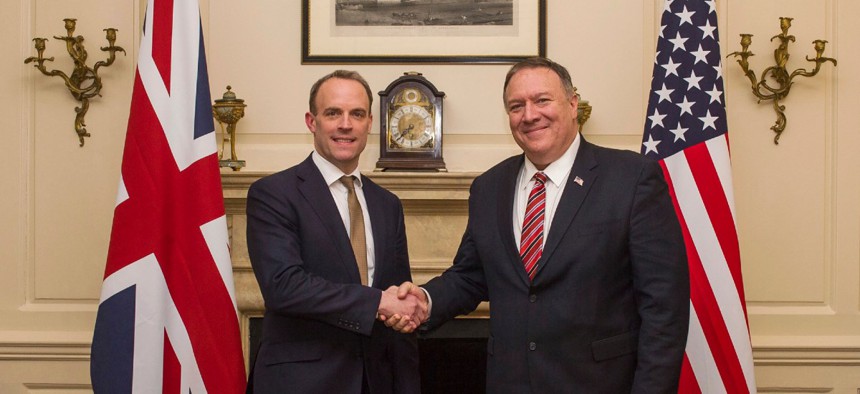Britain and America Have a China Problem

U.K. Foreign Secretary Dominic Raab shakes hands with U.S. Secretary of State Mike Pompeo, right, in London Jan. 29. Peter Summers/Pool via AP
London’s and Washington’s differing assessments of Beijing’s rise point to deeper issues between the two countries.
Everything is just fine. Okay, there’s the Huawei thing. And the disagreement over how to deal with Iran. And global warming, trade wars, NATO, an investigation into Prince Andrew, and the requested extradition of the wife of an American diplomat who killed a British teenager. Oh, and there was that thing where the British ambassador was unceremoniously dumped after being criticized by the American president. Still, all of these are merely “wrinkles” in what remains a very smooth and special relationship between the United States and Britain.
At least this was the message British Foreign Secretary Dominic Raab and U.S. Secretary of State Mike Pompeo projected in London today.
Onstage, Raab and Pompeo were at pains to play down the disagreements over Huawei—Britain this week gave the Chinese telecom giant the go-ahead to build some of its 5G network, despite intense American lobbying against such a decision—and everything else. “True friends don’t always agree on everything, but you work your way through all of those issues,” Raab said. “The sea of things we do agree on overwhelms the occasional drop of disagreement, and that’s the strength of the relationship.” For Raab, these occasional drops were only about the means to a common end. Pompeo agreed.
Let’s test these statements on their own merits. First, are the United States and Britain really being candid with each other about where they disagree? Second, do they really share the same analysis of the world and its challenges? And finally, is this really only about means and not about ends? In all three cases, the answer appears to be no.
First, however much Raab and Pompeo protested, the real story from their love-in was what was not said. On the greatest foreign-policy consideration of all, how to deal with China’s rise, London no longer seems to share Washington’s strategic assessment, but this reality was not addressed head-on. In other words, the two allies don’t share the same analysis of the world and its challenges—not simply regarding means, but ends as well.
In London, Pompeo set out the U.S. position in the clearest terms possible. International terrorism was no longer the principal existential threat to the West: China was. “Times move on,” he said. “While we still have to be enormously vigilant … the Chinese Communist Party presents the central threat of our times.” Pompeo’s logic was straightforward: China has the economic might to put real force into its philosophical challenge to democratic capitalism. American hegemony is imperiled—and not by ISIS, Iran, Russia, or anyone else. Only Beijing.
Whether this was spin or something else, Pompeo was also clear about what has to be done. It “will take a concerted effort, not just by the United States, but by all of us who love freedom and cherish democracy and the rule of law to ensure that [that] remains the predominant model for the world for the next century,” he said. Put another way: China threatens not only American power, but also the Western way of life.
But it’s not obvious that Britain agrees. Even putting the Huawei decision aside, London appears to have already calculated that China is a land paved with gold it cannot afford to stay away from. The turning point was Chinese President Xi Jinping’s 2015 state visit to the U.K.—the brainchild of Prime Minister David Cameron and his influential chancellor George Osborne. Xi was given the honor of a royal carriage ride down the Mall and a state banquet at Buckingham Palace. The visit was heralded as the start of a “golden era” of Anglo-Chinese relations. The U.K. government declared its intention then to be China’s “best partner in the West.”
The immediate result of this trip was billions of pounds worth of commercial deals. But it was the strategic choice that was important, not the immediate financial impact. In the five years since, London has become the international center for clearing Chinese currency—a potential long-term gold mine for Britain. Osborne’s calculation, endorsed by Cameron, was that Chinese wealth and power were a fact of life, not a debate. Therefore, in the conservative tradition of dealing with the world as it is, not as it should be, he argued that Britain should take advantage before other European rivals could. Cameron and Osborne argued at the time that the U.K. was in a “global race,” and the only sensible thing was to fight to the front of it.
Britain’s politicians aren’t the only ones who see that fact of life. The head of Britain’s secret intelligence service, MI6, Alex Younger, set out the changing landscape confronting London in a rare speech in 2018. “Basically, power, money, and politics is going east,” he said. “That’s a new political reality we need to adjust to.”
In London, China does not look like “the central threat of our times,” as Pompeo put it, but the central cash cow. Wealth and power are moving east and so is London’s gaze, special relationship or not.





